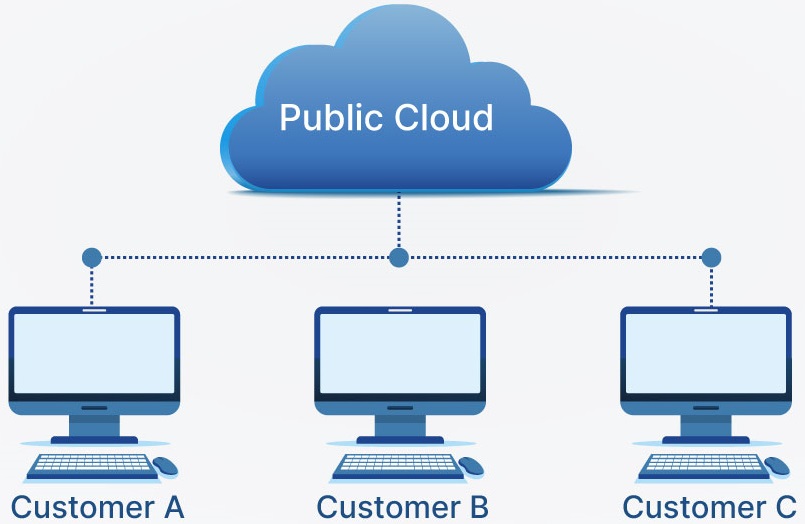What is Public Cloud?
A public cloud is a type of cloud computing in which computing resources, such as servers, applications, storage, etc., are owned and operated by a third-party service provider and made available to customers on a pay-as-you-go basis. This article explains what exactly a public cloud is. We will also discuss its benefits and challenges in detail.
Are you aware Amazon Web Services (AWS), Microsoft Azure, Google Cloud, etc., are examples of which type of cloud? These are examples of a public cloud. In this article, we will discuss Public Cloud in great depth.
You can also explore: Evolution of Cloud Computing
But, before we explore the public cloud in-depth, let’s first go through the list of topics listed under the table of contents (TOC) that we will cover in this article.
Table of Contents (TOC)
Best-suited Cloud Computing courses for you
Learn Cloud Computing with these high-rated online courses
What is a Public Cloud?
Definition: A public cloud is a type of cloud computing in which computing resources, such as servers, applications, storage, etc., are owned and operated by a third-party service provider and made available to customers on a pay-as-you-go basis.
In layman’s terms, a public cloud is a shared platform available to the general public over the Internet and managed by a third-party provider. In this type of cloud computing, the same storage can be used and accessed by n number of users at a given time.
Organizations or customers using public clouds do not have to pay any amount to maintain the infrastructure they are using. They rent the infrastructure or services for a specific period and pay accordingly. Thus, saving a lot of money.
You can also explore: Top Cloud Computing Interview Questions and Answers
Advantages of Public Cloud
Here are some of the advantages of a public cloud:
Cost-effective
One of the biggest advantages of using a public cloud is its low cost. Customers or organizations using this cloud computing only pay for the services they are using. They don’t have to pre-register or purchase the infrastructure or services they want to use. They can choose the service they want to use and pay for it without investing a lumpsum amount of money in physical infrastructure. And as the services are shared among multiple users at the same time, the cost also decreases because of this.
Easily scalable
Public clouds are easily scalable. This is because they are designed to provide on-demand access to a vast pool of computing services. Thus, customers can scale the usage up or down as per their requirements.
Easily accessible
One of the other biggest advantages of using a public cloud is that the organizations or the users using this cloud computing can access their data from anywhere in the world having an internet connection. It doesn’t matter that they are located in a remote place; the only thing they need to access their data is an internet connection. Thus, increasing the accessibility factor.

Highly reliable
Large organizations with a proven track record of providing reliable and secure service even in remote locations operate public clouds. Hence, this type of cloud computing is quite reliable.
Saves time
As this cloud computing is maintained and managed by a third-party service provider, users or organizations using this cloud don’t have to invest their time in maintaining data centers, assembling servers, etc. Thus, the users can use this time for other productive work.
Easy setup
It is very easy to set up a public cloud. You would only require about three to four hours, depending on the service provider that you have chosen. Users can easily purchase, set up, and deploy it remotely.
You should also explore: Introduction to Cloud Computing Deployment Models
Disadvantages of Public Cloud
Here are some of the disadvantages of a public cloud:
Security
This is one of the most serious concerns when it comes to public clouds. As multiple users share public clouds simultaneously, it raises a huge number of security concerns, such as data breaches, hacking, etc. In short, public clouds are less secure in comparison to private or hybrid clouds because resources are shared publicly.
You can also explore: Types Of Hackers To Be Aware Of In 2023
Lack of control
As third-party service providers manage everything, users or organizations don’t have full control. And due to a lack of control, users lack the ability to customize the environment as per their requirements. This can result in a loss of productivity.
Vendor lock-in
It may happen that using a particular vendor, such as AWS, Microsoft Azure, etc., can make a user particularly habitual and dependent on it. Thus, making it difficult and challenging for a user or organization to switch to a new vendor in the future.
Performance issues
The Internet is the backbone of public clouds, and accessibility depends on the Internet. Therefore, if the internet speed is low, the performance decreases substantially.
Less customizable
Public clouds are far less customizable in comparison to private or hybrid clouds. Therefore, it is less preferred by organizations or users who need customized resources for their usage.
You must explore: Difference Between Public Cloud And Private Cloud
Conclusion
In this article, we have explored what a public cloud is. We have also explored its advantages and disadvantages in detail. If you have any queries related to the topic, please feel free to send your queries to us. We will be happy to help.
Happy Learning!!

Anshuman Singh is an accomplished content writer with over three years of experience specializing in cybersecurity, cloud computing, networking, and software testing. Known for his clear, concise, and informative wr... Read Full Bio



